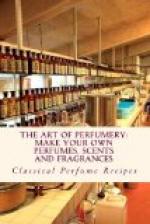1. Take sheets of light cartridge paper, and dip them into a solution of alum—say, alum, one ounce; water, one pint. After they are thoroughly moistened, let them be well dried; upon one side of this paper spread a mixture of equal parts of gum benzoin, olibanum, and either balm of Tolu or Peruvian balsam, or the benzoin may be used alone. To spread the gum, &c., it is necessary that they be melted in an earthenware vessel and poured thinly over the paper, finally smoothing the surface with a hot spatula. When required for use, slips of this paper are held over a candle or lamp, in order to evaporate the odorous matter, but not to ignite it. The alum in the paper prevents it a to certain extent from burning.
2. Sheets of good light paper are to be steeped in a solution of saltpetre, in the proportions of two ounces of the salt to one pint of water, to be afterwards thoroughly dried.
Any of the odoriferous gums, as myrrh, olibanum, benzoin, &c., are to be dissolved to saturation in rectified spirit, and with a brush spread upon one side of the paper, which, being hung up, rapidly dries.
Slips of this paper are to be rolled up as spills, to be ignited, and then to be blown out.
The nitre in the paper causes a continuance of slow combustion, diffusing during that time the agreeable perfume of the odoriferous gums. If two of these sheets of paper be pressed together before the surface is dry, they will join and become as one. When cut into slips, they form what are called Odoriferous Lighters, or Perfumed Spills.
SECTION VIII.
PERFUMED SOAP.
The word soap, or sope, from the Greek sapo, first occurs in the works of Pliny and Galen. Pliny informs us that soap was first discovered by the Gauls, that it was composed of tallow and ashes, and that the German soap was reckoned the best. According to Sismondi, the French historian, a soapmaker was included in the retinue of Charlemagne.
At Pompeii (overwhelmed by an eruption of Vesuvius A.D. 79), a soap-boiler’s shop with soap in it was discovered during some excavations made there not many years ago. (Starke’s Letters from Italy.)
From these statements it is evident that the manufacture of soap is of very ancient origin; indeed, Jeremiah figuratively mentions it—“For though thou wash thee with natron, and take thee much soap, yet thine iniquity is marked before me.” (Jer. 2:22.)
Mr. Wilson says that the earliest record of the soap trade in England is to be found in a pamphlet in the British Museum, printed in 1641, entitled “A short Account of the Soap Business.” It speaks more particularly about the duty, which was then levied for the first time, and concerning certain patents which were granted to persons, chiefly Popish recusants, for some pretended new invention of white soap, “which in truth was not so.” Sufficient is said here to prove that at that time soap-making was no inconsiderable art.




